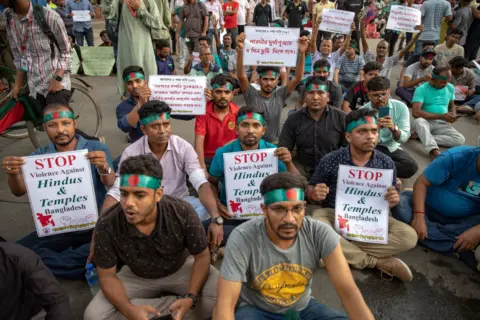 Getty Images
Getty ImagesThe videos are shocking: buildings burning, horrifying violence and women weeping as they plead for help.
They are – the people sharing them say – proof of a “Hindu genocide” happening in Bangladesh in the wake of the sudden fall of the country’s long-time leader, Sheikh Hasina.
Stephen Yaxley-Lennon, who uses the name Tommy Robinson – a British far-right activist who has been criticised for making inflammatory posts during the UK riots – has got involved, sharing videos along with dark warnings.
But we found that many of the videos and claims shared online are false.
False claim of Hindu temple attack
Bangladesh has been in the headlines for weeks: student-led protests which left more than 400 dead culminated with the government falling and Prime Minister Sheikh Hasina fleeing to India on 5 August.
Celebrations escalated into violent unrest, with rioters targeting members of her ruling Awami League party which is made up of both Hindu and Muslim members.
And while reports on the ground have found violence and looting impacted Hindu people and properties, far-right influencers in neighbouring India shared false videos and information that gave a misleading view of the events.
They claimed to show communal violence against Hindus purportedly carried out by “Islamist radicals” with a violent agenda.
One viral post claimed to show a temple set on fire by “Islamists in Bangladesh”.
However, BBC Verify has determined that this building, identified as the Navagraha Temple in Chittagong, was undamaged by the incident which actually occurred at a nearby Awami League party office.
Pictures obtained by the BBC after the fire show debris of posters with Awami League members’ faces.
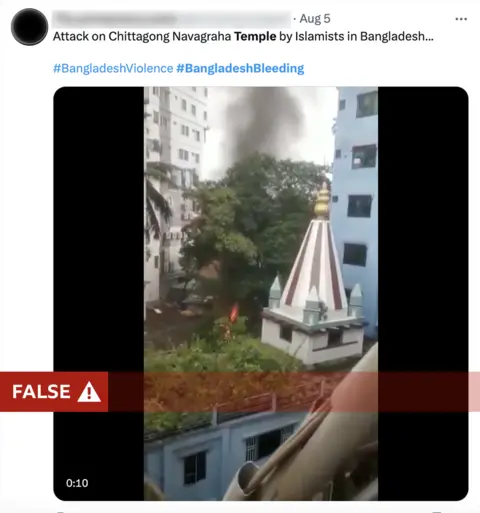 X
X“On 5 August, there was an attack on the Awami League office premises behind the temple in the afternoon,” Swapan Das, a staff member at the temple, told BBC Verify. “They took the furniture outside and set fire to it.”
Mr Das added that although the temple was not attacked on the day, the situation remains tense and the temple has been shut with people guarding it round-the-clock.
This is far from the only story shared, most under the same hashtag, which has had nearly a million mentions since 4 August, according to social media monitoring tool Brandwatch. Accounts that were mostly geolocated to India drove the trend.
Other viral posts which have since been debunked include a claim that a Bangladeshi Hindu cricketer’s home had been burned down. BBC Verify has established the house in fact belongs to a Muslim MP from the Awami League.
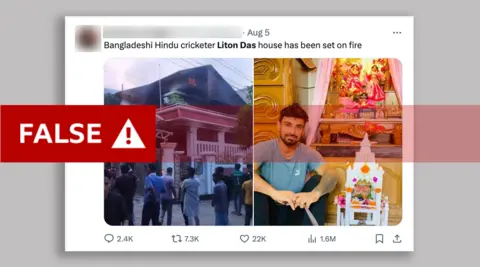 X
XThen there was the school that burned down, which the BBC visited. Again, the reasons behind the attack appear to be political rather than religious.
All of these posts have been shared by multiple accounts, many of which support Hindu-nationalist values.
Inter-religious strains have been present in Bangladesh for many decades, says Professor Sayeed Al-Zaman, an expert in hate speech and disinformation in Bangladesh.
Following the hasty departure of Sheikh Hasina, matters have come to a head once again, “as Hindus felt insecure in the absence of the government and effective law and order”, says Prof Al-Zaman.
The false narratives have made the situation worse. “Fear-mongering by these influencers is inflaming the tension.”
Global spread
Some of these posts falsely claiming that Hindus have been targeted by Muslims have been shared by accounts far removed from either Bangladesh or India.
Tommy Robinson who has been criticised for posting inflammatory messages about the violent riots targeting Muslims and immigrants across the UK, has been sharing unverified videos from Bangladesh, where he says there is “a genocide on Hindus”.
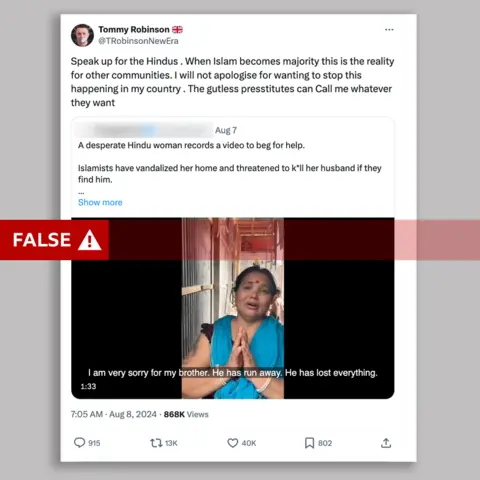 X
XWe have investigated one video shared by him. It shows a woman pleading for her husband’s life as her home is attacked. The post falsely claims the property is being targeted by “Islamists”. The original video was shared on 6 August, onde day after the property had been attacked.
However, when the BBC investigated the story behind the video, a different narrative emerged.
We were told by a group of local students who had assisted the woman in defending her property that the dispute was about an entirely different matter. They shared photos and videos of the clean-up with the BBC which show the property as seen in the original video. The Hindu temple inside the property is unharmed.
“The conflict is about ownership of land. A case was filed long ago,” a student told us. A case has been in local courts about the ownership of the land for nearly six months.
We’ve spoken to other people in the local area who’ve told us that the attack was not religiously motivated and that the perpetrators were a mix of Hindu and Muslim people. They also reported that other Hindu families and temples in the area weren’t affected.
Tommy Robinson did not respond to our request for comment.
Working out exactly what has happened in Bangladesh over the last few weeks has proved difficult.
Many real incidents and attacks have taken place across the country, but the motivations are difficult to assess: religion or politics.
The two are closely entwined: one Hindu resident explained how the minority are largely viewed as supporters of Sheikh Hasina’s secular Awami League party.
AFP fact-checker for Bangladesh, Qadaruddin Shishir, told the BBC that there have been attacks on Hindu-owned properties.
But, he said, “right-wing Indian accounts are spreading these politically motivated attacks as religious ones.”
Bangladesh Hindu Buddhist Christian Unity Council, a non-profit established to protect minority human rights, reported five Hindu people killed. Two have been confirmed as Awami League members.
The AFP has put the count of Muslim Awami League leaders’ who have been killed at more than 50.
Student protesters defend Hindu temples
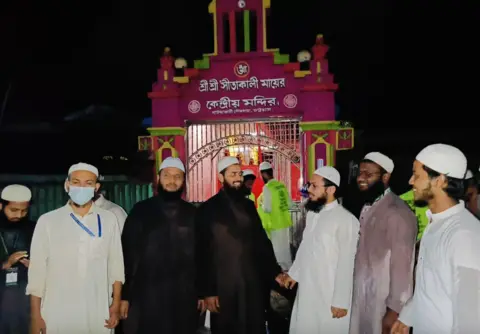
When false claims about attacks on Hindus went viral online, some Muslim protesters decided to guard Hindu temples.
“It’s our responsibility to protect them,” said Moinul, who stood watch last week in front of a temple in Hatharazi, outside of Chittagong.
Viral social media posts were trying to “incite conflict between Hindus and Muslims,” said Moinul. “But we are not falling for it.”
Choton Banik, a local Hindu in the area who attended the temple, asked that they continue their effort “through this critical time.”
“I hope that we will continue to live together in this independent Bangladesh in the future,” he said.
Additional reporting by Kumar Malhotra and Josh Cheetham










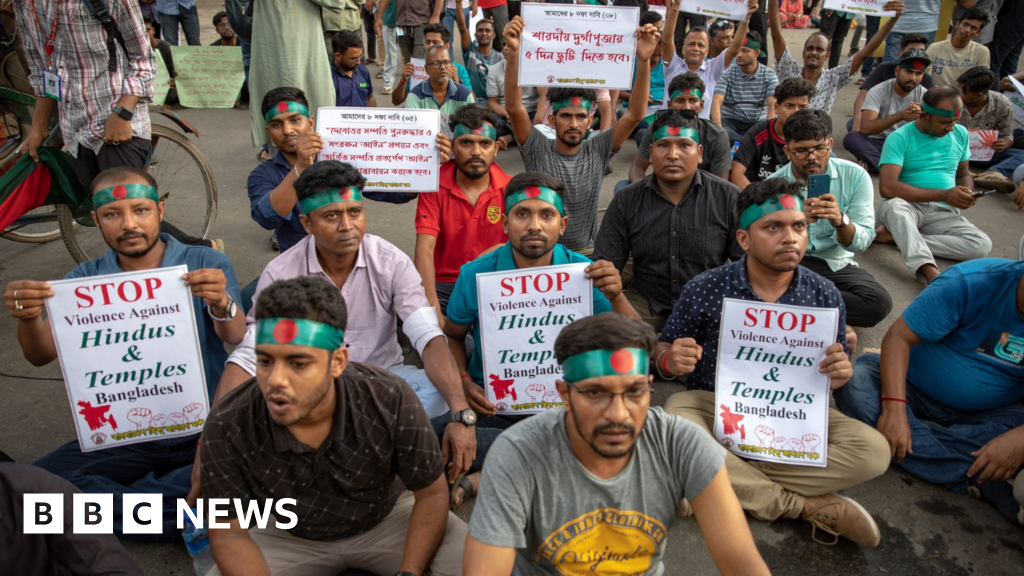











Discussion about this post